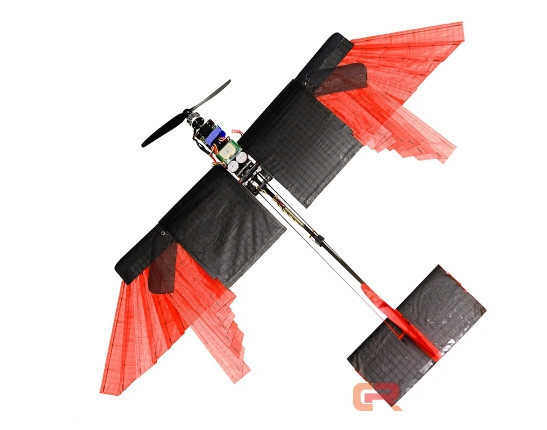
As early as 160 million years ago, birds began to fly with their wings. Feather wings allow them to transform freely in the air, resist different wind directions, and even adapt to the environment. However, bird aviation experts stated that they all face a common problem: the wings not only bring lift, but also drag, and lift is very important when the aircraft starts and lands. Force will prevent aircraft from flying faster. A good solution at present is to create an aircraft that can automatically change the length of the wings. According to media reports, researchers at the Intelligent Systems Laboratory of the EPFL in Lausanne have recently developed a wing-powered, low-energy drone that can change the length of the wingspan during flight and can also be used in narrow spaces. High-speed flight. Researcher Dario Floreano explains: “The reason why birds can change the size and shape of wings is because their articulated skeleton is controlled by muscles and covered with feathers. When the wings are folded, the feathers will overlap.† (Source: spectrum.ieee) In order to allow the drone to fly like a bird, the EPFL researchers used artificial feathers containing glass fiber and covered it with a layer of nylon, reinforced with carbon fiber. With a pair of wings, drones can fly quickly in the air, and when the wings are folded together, they can withstand strong winds. Xiao Bian learned that this folding wing with artificial feathers can change its surface area by 41%: when the wing is completely folded, its lift will increase by 32%, drag force will be reduced by 40%, and the drone's The maximum speed will increase from 6.3 meters per second to 7.6 meters per second. However, it is worth noting that the reduced wing area will also make the UAV less mobile, which is why the deformable wings are so important. The drones developed by the EPFL can change the span length during flight, fold wings when needed, and expand when not needed. This kind of drone can freely pass through obstacles, resist strong winds, and adjust its wings according to the wind direction. Artificial feather wings have helped the research team achieve aerodynamic goals. One of the biggest challenges for drones is the difficulty in finding a balance between aerodynamic efficiency and equipment weight. Adding such a device to the fuselage is undoubtedly a challenge because it occupies the body area of ​​the drone. This kind of drone has 8 very light artificial feathers on each wing, which can be stretched and shrunk. Like real birds, it will not be overloaded because of its heavy wings. In addition, Lei Feng Network also learned that this drone can also accept remote control, the body is equipped with an electronic board, can record the engine, drone flight position and GPS positioning and other important information. As a result, you don't have to worry about losing it. EPFL researchers hope to increase the stability of drones in cities with high wind speeds through artificial feather wings, allowing people to use drones more freely to complete tasks.
(Source: spectrum.ieee) In order to allow the drone to fly like a bird, the EPFL researchers used artificial feathers containing glass fiber and covered it with a layer of nylon, reinforced with carbon fiber. With a pair of wings, drones can fly quickly in the air, and when the wings are folded together, they can withstand strong winds. Xiao Bian learned that this folding wing with artificial feathers can change its surface area by 41%: when the wing is completely folded, its lift will increase by 32%, drag force will be reduced by 40%, and the drone's The maximum speed will increase from 6.3 meters per second to 7.6 meters per second. However, it is worth noting that the reduced wing area will also make the UAV less mobile, which is why the deformable wings are so important. The drones developed by the EPFL can change the span length during flight, fold wings when needed, and expand when not needed. This kind of drone can freely pass through obstacles, resist strong winds, and adjust its wings according to the wind direction. Artificial feather wings have helped the research team achieve aerodynamic goals. One of the biggest challenges for drones is the difficulty in finding a balance between aerodynamic efficiency and equipment weight. Adding such a device to the fuselage is undoubtedly a challenge because it occupies the body area of ​​the drone. This kind of drone has 8 very light artificial feathers on each wing, which can be stretched and shrunk. Like real birds, it will not be overloaded because of its heavy wings. In addition, Lei Feng Network also learned that this drone can also accept remote control, the body is equipped with an electronic board, can record the engine, drone flight position and GPS positioning and other important information. As a result, you don't have to worry about losing it. EPFL researchers hope to increase the stability of drones in cities with high wind speeds through artificial feather wings, allowing people to use drones more freely to complete tasks.